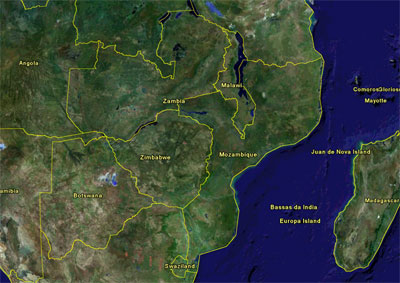MOZAMBIQUE
Please note, this page is not longer being updated. For more recent information, please see news.mongabay.com and use the search function to find the country feed. For more up-to-date data on forest cover and loss, check out Global Forest Watch.
| Mozambique Forest Figures
Forest Cover Total forest area: 19,262,000 ha % of land area: 24.6% Primary forest cover: n/a % of land area: n/a % total forest area: n/a Deforestation Rates, 2000-2005 Annual change in forest cover: -50,000 ha Annual deforestation rate: -0.3% Change in defor. rate since '90s: 2.6% Total forest loss since 1990: -750,000 ha Total forest loss since 1990:-3.7% Primary or "Old-growth" forests Annual loss of primary forests: n/a Annual deforestation rate: n/a Change in deforestation rate since '90s: n/a Primary forest loss since 1990: n/a Primary forest loss since 1990:n/a Forest Classification Public: 100% Private: n/a Other: n/a Use Production: 17.5% Protection: n/a Conservation: 2.3% Social services: n/a Multiple purpose: 80.2% None or unknown: n/a Forest Area Breakdown Total area: 19,262,000 ha Primary: n/a Modified natural: 19,224,000 ha Semi-natural: n/a Production plantation: 38,000 ha Production plantation: n/a Plantations Plantations, 2005: 38,000 ha % of total forest cover: 0.2% Annual change rate (00-05): n/a Carbon storage Above-ground biomass: 978 M t Below-ground biomass: 235 M t Area annually affected by Fire: n/a Insects: n/a Diseases: n/a Number of tree species in IUCN red list Number of native tree species: n/a Critically endangered: 4 Endangered: 2 Vulnerable: 40 Wood removal 2005 Industrial roundwood: 1,732,000 m3 o.b. Wood fuel: 20,297,000 m3 o.b. Value of forest products, 2005 Industrial roundwood: n/a Wood fuel: n/a Non-wood forest products (NWFPs): n/a Total Value: n/a More forest statistics for Mozambique |
While forest covers nearly a quarter of the country, Mozambique has little tropical forest coverage. Nevertheless, deforestation rates are quite low—only 3.7 percent of the country's forest cover was lost between 1990 and 2005—and have not increased significantly in the past five years. As of 2003, 5.7 percent of the country was under some form of protection, although poaching is a problem in some areas. Mozambique's large protected area is Limpopo National Park, which is part of the larger Great Limpopo Transfrontier Park, consisting of Limpopo, Kruger National Park in South Africa, and Gonarezhou National Park in Zimbabwe.
In the early to mid-2000s, an American internet executive committed more than $30 million to rebuilding Gorongosa National Park in central Mozambique as an ecotourism destination. Greg Carr, former chairman of Prodigy Internet and Boston Technology, planned to reintroduce animals from elsewhere in Africa
Mozambique has 685 species of birds, 195 mammals, 228 reptiles, 59 amphibians, and nearly 5,700 species of plants.
In 2005, Mozambique launched a "Small Grants Programme" with the support of the United Nations Development Programme (UNDP). This provides grants of up to US$50,000 and other support to community-based groups and non-governmental organizations for activities that address land degradation, biodiversity, and climate-change issues at the local level.
Recent articles | Mozambique news updates | XML
Suggested reading - Books
- Lonely Planet Mozambique
- The Bradt Travel Guide Mozambique
- Mozambique Travel Guide
- Birds of Eastern Africa
Unless otherwise specified, this article was written by Rhett A. Butler [Bibliographic citation for this page]
Other resources
Contact me if you have suggestions on other rainforest-related environmental sites and resources for this country.

Image copyright Google Earth, MDA EarthSet, DigitalGlobe 2005
CIA-World Factbook Profile
FAO-Forestry Profile
World Resources Institute
Last updated: 4 Feb 2006
